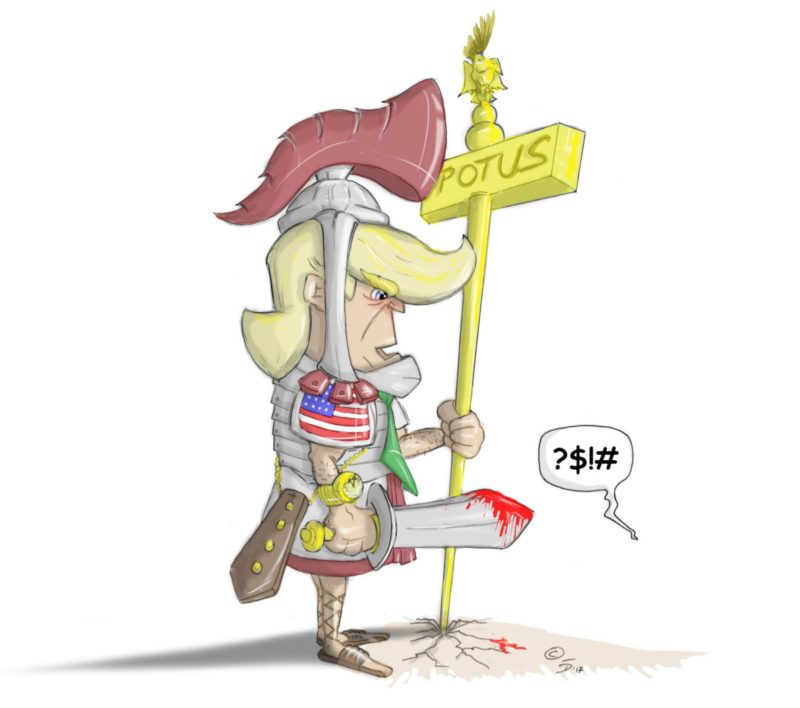A Problem of Empire
by Jim Palombo
Politics Editor
No doubt the U.S. is facing a myriad of national and international problems. Included in the mix are issues tied to equality, racism, crime, immigration, personal and public health, infrastructure rebuilding, terrorism, and war. In this context it’s not hard to wonder whether the country is falling prey to what can be termed “empire fatigue.” In other words it may well be that, like with the Roman Empire, we are now seeing the elements of our own collapse.
But are we indeed an empire? There are some who argue that the notion of our problems being tied to our “empire” is an unjust overstatement. By its classical definition an empire means using military, economic and cultural power in annexing territories. Especially in regards to the interests of annexing other countries we don’t seem to fit this definition. However there is a close cousin to the empire characterization to consider. In other words it may be that the U.S. acts in a more hegemonic way – where the spreading of one’s ideological presence takes place without annexation, where via the use of economic, military and diplomatic pressures the country’s power is spread without actual annexation. In spite of those who argue that the U.S. has simply proceeded along its way as situations have dictated, without any particular “macro” design, it nonetheless seems accurate that a form of empire building has taken place.
This clarification not only has an impact on how we examine our country’s problems but also on how other countries might perceive our efforts in terms of international affairs. In other words how do other country’s view the U.S.’s interest in global concerns? Do we represent to them a benevolent enterprise, one that has at its core developing and spreading the benefits of democracy, one that uses diplomacy and the military to help prevent obstruction relative to these ends? Or are we more economically motivated, interested primarily in maintaining and expanding our capitalist interests across the world, using the power of our diplomatic and military might to those ends? Or are our efforts a mix of both, attempting to pursue what seems like contradictory objectives, perhaps even using the former interpretation to mask the latter.
These are obviously important considerations. And two of the most salient issues that speak to the interpretive concern at hand are the environmental crises and nuclear proliferation. Both speak to problems that we have had a heavy hand in creating and problems that we seem compelled to help the rest of the world address. And in this context it’s fair to question our motives in addressing these international concerns. Let’s take a closer look at the query.
It’s no secret that much of the environmental problems are tied to the U.S.’s industrial development. In other words what we see around us today can be traced to our country’s interests in natural resources and the residual effects of turning those resources into productive, growth related commodities. In this context we have benefitted from generally ignoring environmental concerns (in the country and abroad), essentially watching our corporate stock rise while watching the environment go in another direction.
Unfortunately, in addressing current environmental concerns, we now find ourselves in a rather tough situation. In other words it appears we are trying to curtail the environmental abuses of others after we have actually benefitted from those abuses. Therefore any environmental regulations can be seen to hamper other’s economic endeavors while allowing us to maintain the proverbial leg-up on their competitive efforts. Said another way the situation has led to accusations of our interests being pointed more at maintaining our supremacy than addressing environmental damage – which, especially given our empire-like track record, is an accusation hard to deflect.
The same logic applies to nuclear concerns. Again it’s no secret that we are the only country to actually use nuclear bombs, demonstrating their power in closing WWII in Japan. And it’s no secret that our nuclear arsenal is unsurpassed in terms of preemptive, preventative or defensive strategies. This of course has happened within the context of other nation building, i.e., our continued need for nuclear power seems underscored by what has happened across the world. (Think Cold War, the Middle and Far East.) Yet questions remain as to our intent in curbing nuclear weapon development. Could we seriously endorse nuclear weapon abolition-which would essentially mean giving up our current advantage? After all, human nature being what it is, especially in regards to our collective history of managing war as much as seeking peace, suggests that another nuclear age will simply resurface. Should we then proceed to give up our advantage as it stands? As to a nuclear weapon freeze or disarmament – doesn’t this strategy imply to others that we merely wish to maintain the “empire advantage” we know have? And with agreements that pertain to the control of nuclear developments – here again doesn’t this speak to maintaining our current advantage?
It’s rather clear that with both environmental and nuclear concern we are in a difficult spot. There are many in the world who simply don’t care for us, especially in regard to our “empire” status. They see us as a country that continues to bolster its own power at every turn, a country that whether through its power over diplomacy or military strategy will do whatever it needs to do to maintain its global supremacy, especially relative to economic benefit.
So the question becomes what do we do? Can we use our military might to simply quell any serious dissent? We certainly have the weapons to take this course. Or can we mitigate our empire image in some way – perhaps trying to develop more effective diplomacy in light of our actual power? Will/can others trust us in this regard?
These are no doubt serious questions amid serious times. And in the context of both it appears that we need to get a sense of the true nature of our American experiment. Over the years a number of our country’s leaders have asked the public: what kind of country do we really want to be? It would seem that the real struggle is with first figuring out who we actually are. Hopefully, with this initial step, we can then see what our future prospects may actually look like, both in and out of country.
(In terms of the notion of empire there is an informative article by Daniel Larison, “Empire and Hegemony,” printed in the Oct. 25, 2011, edition of The American Conservative magazine. Relative to environmental and nuclear concerns there are two engaging books. The first is by Ted Nordhaus and Michael Shellenberger, BREAK THROUGH – From the Death of Environmentalism to the Politics of Possibility, Houghton Mifflin Publishers. The second is by Jonathan Schell, THE SEVENTH DECADE – The New Shape of Nuclear Danger, Henry Holt Publishers. And in regards to developing a better understanding of our ideological identity please see the Campaign for an Informed Citizenry at www.cicorg.com.)
About the author:
 Jim Palombo is politics editor of Ragazine.CC. You can read more about him in About Us.
Jim Palombo is politics editor of Ragazine.CC. You can read more about him in About Us.

Recent Comments